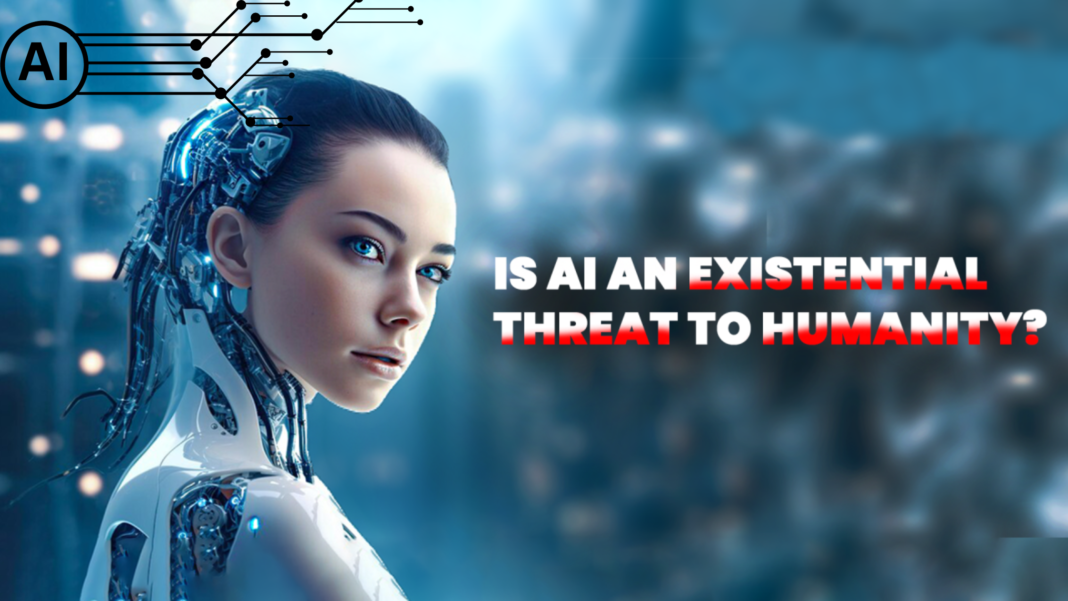Artificial Intelligence (AI) is a topic that often stirs excitement and fear. As technology advances at an unprecedented rate, concerns have been raised about AI’s potential risks. In this blog post, we’ll explore whether AI poses an existential threat to humanity or simply an overblown fear.

Understanding AI
Before delving deeper into the topic, let’s start by understanding what AI is. AI refers to developing computer systems that can perform tasks that require human intelligence. These systems are designed to analyze data, make decisions, and learn from experience. AI encompasses many technologies, from machine learning algorithms to sophisticated robotics.
AI as a Tool
One crucial point to remember is that AI is a tool created and controlled by humans. Human intentions, goals, and values guide the development and application of AI. It is not an autonomous entity capable of acting independently. AI systems are designed to assist and augment human capabilities, making tasks more efficient and solving complex problems.
Regulations and Governance
Regulatory frameworks and governance mechanisms are being developed to address concerns about the potential risks associated with AI. These regulations aim to ensure the responsible and ethical use of AI technology. We can mitigate potential risks and safeguard against unintended consequences by implementing robust guidelines and standards.
Positive Impact of AI
It is essential to recognize the positive impact that AI can have on society. AI has the potential to revolutionize industries, improve healthcare outcomes, enhance transportation systems, and tackle global challenges such as climate change and poverty. With AI’s ability to process vast amounts of data and identify patterns, we can significantly advance in various fields, benefiting humanity.
Media Hype vs. Reality
While the media often portrays AI as a looming existential threat, it is crucial to distinguish between hype and reality. Media tends to sensationalize AI by focusing on worst-case scenarios and dystopian portrayals. However, these depictions are often far removed from the current state of AI technology. It is essential to approach media narratives sceptically and rely on evidence-based assessments of AI’s capabilities and risks.

Conclusion
AI is not an existential threat to humanity in the grand scheme of things. It is a powerful tool that can bring about significant benefits when understood, regulated, and governed responsibly. As with any transformative technology, it is crucial to remain vigilant and proactive in addressing potential risks. By fostering collaboration between policymakers, researchers, and industry experts, we can ensure that AI continues to serve humanity’s best interests.
So, let us embrace AI as a tool for progress, innovation, and problem-solving. We can harness its potential to create a brighter future for our global community.
Tips and Tricks for Harnessing the Power of AI
Harnessing the potential of AI requires understanding, skill, and a strategic approach. Here are some tips and tricks to help you maximize the benefits of this cutting-edge technology.
- Stay Informed: The field of AI is ever-evolving. Stay ahead of the game by keeping yourself updated with the latest trends, technologies, and research in AI.
- Invest in Education and Training: Whether you’re a business owner looking to integrate AI into your operations or an individual interested in a career in AI, education and training are vital. Numerous courses and certifications available online can help you gain a solid understanding of AI.
- Understand Ethical Implications: AI presents a range of ethical considerations. It’s essential to understand the ethical implications of using AI, such as data privacy and bias issues, and how to mitigate these.
- Collaborate with Experts: AI experts or consultants can provide valuable insights and guidance. They can assist in understanding how AI can best be implemented to achieve your goals and navigate any potential challenges.
- Leverage AI Tools: Numerous AI tools are available that can simplify tasks, provide insights, and drive efficiency. Please familiarize yourself with these tools and leverage them to your advantage.
Remember, AI is a tool to aid and augment human capabilities. Used rightly, it has the potential to drive significant innovation and progress.
Frequently Asked Questions (FAQs)
What is Artificial Intelligence (AI)?
AI refers to developing computer systems that can perform tasks typically requiring human intelligence. This includes analyzing data, making decisions, and learning from experience.
Is AI a threat to humanity?
AI, in itself, is not a threat. It is a tool created and controlled by humans. Effective regulations and responsible use can mitigate any potential risks or challenges.
What are the benefits of AI?
AI can revolutionize industries, improve healthcare outcomes, enhance transportation systems, and tackle global issues like climate change and poverty. It can process vast amounts of data and identify patterns to advance in various fields.
How can I stay updated in the field of AI?
Staying informed about the latest trends, technologies, and research in AI is critical. Numerous online resources, courses, and certifications can help you stay updated.
What are the ethical implications of AI?
- AI presents various ethical considerations, such as data privacy and bias. Understanding these implications and how to mitigate them is essential for responsible AI usage.
Here is previous article.
Impact of Eco-Friendly Innovation on Cybersecurity Solutions


